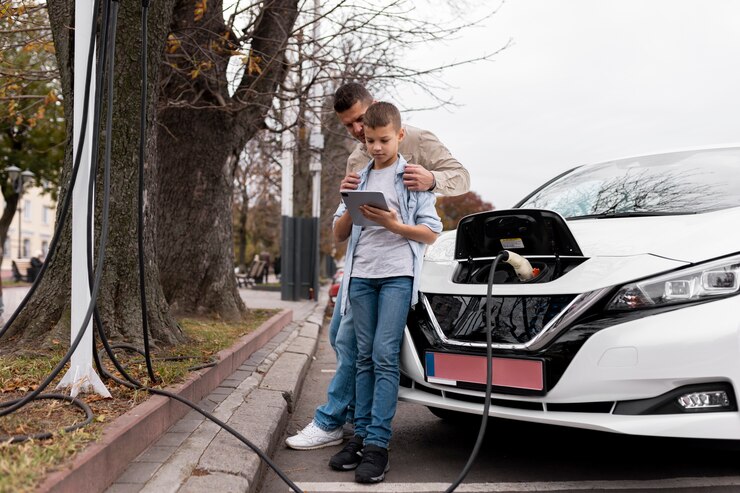TECHNOLOGY
The Essential Guide to Home EV Charger Installation

The electric vehicle (EV) revolution is underway, and with it comes the need for convenient and efficient charging solutions. Home EV charger installation is becoming increasingly popular as more people make the switch to electric vehicles. However, navigating the process of installing a home EV charger can be daunting for many homeowners. Here, we’ll explore the key considerations for installing a home EV charger, from choosing the right charger to understanding installation requirements and costs. So this information will be of help if you are considering home EV charger installation.
- Choosing the Right Charger
When it comes to home EV charger installation, the first step is selecting the right charger for your needs. There are several factors to consider, including charging speed, compatibility with your vehicle, and connectivity options. Level 2 chargers are the most common choice for home installations, offering faster charging times compared to standard Level 1 chargers. Additionally, consider whether you want a smart charger that can be controlled remotely and provide insights into your charging habits.
- Assessing Installation Requirements
Before installing a home EV charger, it’s essential to assess your property’s electrical infrastructure and determine if any upgrades are necessary. Most Level 2 chargers require a 240-volt electrical circuit, similar to what’s used for large appliances like electric dryers or stoves. If your home doesn’t already have a suitable electrical outlet near your desired charging location, you may need to hire a licensed electrician to install one.
- Understanding Permitting and Regulations
Depending on where you live, home EV charger installation may be subject to local permitting and regulations. Before proceeding with installation, check with your city or municipality to determine if any permits are required. Additionally, familiarize yourself with any building codes or regulations that may apply to EV charger installations in your area. Failure to comply with permitting and regulations could result in fines or delays in the installation process.
- Estimating Installation Costs
The cost of installing a home EV charger can vary depending on several factors, including the charger’s brand and features, your home’s electrical setup, and any necessary upgrades or permits. On average, homeowners can expect to pay between $500 and $2,000 for the installation of a Level 2 EV charger. However, it’s essential to obtain quotes from licensed electricians to get an accurate estimate based on your specific circumstances.
- Hiring a Qualified Electrician
While some homeowners may have the skills to install a home EV charger themselves, hiring a qualified electrician is often the safest and most efficient option. Electricians have the knowledge and expertise to ensure that the installation is done correctly and safely, minimizing the risk of electrical hazards or damage to your property. When hiring an electrician, be sure to choose someone who is licensed, bonded, and experienced in EV charger installations.
- Considering the Charging Location and Accessibility
When planning your home EV charger installation, carefully consider the charger’s location and accessibility. Ideally, the charger should be installed in a convenient location near where you park your vehicle, such as a garage or driveway. Additionally, consider factors such as weather protection, cable length, and clearance space around the charger to ensure ease of use and safety.
- Exploring Incentives and Rebates
Many government agencies and utility companies offer incentives and rebates to encourage homeowners to install EV chargers. These incentives can help offset the cost of installation and make home charging more affordable. Research available incentives in your area, which may include tax credits, rebates, or discounted electricity rates for EV owners. Taking advantage of these incentives can make home EV charger installation even more financially attractive.
- Assessing Electrical Capacity and Compatibility
Before purchasing a home EV charger, it’s essential to assess your home’s electrical capacity and compatibility with the charger you’ve selected. Level 2 chargers require a dedicated 240-volt circuit, which may necessitate upgrades to your electrical panel or wiring if your home’s existing infrastructure isn’t capable of supporting it. An electrician can perform a load calculation to determine if your electrical system can accommodate the additional power demand from the charger and make any necessary upgrades to ensure safe and reliable operation.
- Considering Smart Charging Features
In recent years, smart charging technology has become increasingly popular among homeowners looking to optimize their EV charging experience. Smart chargers offer features such as Wi-Fi connectivity, mobile app integration, and energy management capabilities, allowing users to monitor and control their charging sessions remotely. With a smart charger, you can take advantage of off-peak electricity rates, schedule charging sessions to coincide with periods of lower energy demand, and receive notifications when charging is complete or if any issues arise. While smart chargers may come with a higher upfront cost, their added convenience and potential energy savings can make them a worthwhile investment in the long run.
Installing a home EV charger is a significant investment that can enhance the convenience and efficiency of owning an electric vehicle. By carefully considering factors such as charger selection, installation requirements, permitting and regulations, costs, and hiring a qualified electrician, homeowners can ensure a smooth and successful installation process. With the right charger installed in the optimal location, electric vehicle owners can enjoy the convenience of charging at home and contribute to a cleaner, greener future for transportation.
TECHNOLOGY
WJSFKS Explained: From Digital Slang to Business Framework

Introduction to WJSFKS
Language is constantly evolving, and with the rise of digital communication, new slang terms are emerging at lightning speed. One such term that has captured attention in recent discussions is “WJSFKS.” It might seem like just another jumble of letters at first glance, but this abbreviation holds a deeper meaning and significance. From its origins to its applications in business strategies, WJSFKS has transformed into more than just digital slang; it’s now a framework that influencers and marketers are starting to embrace. Join us as we dive into the fascinating world of WJSFKS—where language meets innovation!
The Origins of WJSFKS
WJSFKS originated in the vibrant world of online communication. It first appeared on social media platforms and forums, where users sought a way to express complex ideas quickly.
The acronym stands for “What Just Happened? So F*cking Crazy Sh*t.” Its roots lie in the spontaneous nature of digital conversations. As memes became prevalent, so did new forms of expression like WJSFKS.
Initially used for humorous reactions to unexpected events, it resonated with those who craved authenticity. This slang captured emotions that words alone often failed to convey.
As its popularity grew, content creators began incorporating WJSFKS into their posts and videos. This helped solidify its place within internet culture and sparked wider adoption across various demographics.
How WJSFKS Became a Popular Digital Slang
WJSFKS emerged as a digital slang term that resonated with internet users. It encapsulates emotions and situations succinctly, making it ideal for fast-paced online communication.
The rise of social media platforms played a pivotal role in its popularity. As people sought quicker ways to express themselves, acronyms like WJSFKS caught on rapidly.
Memes and viral content also contributed to its spread. Influencers began incorporating the term into their posts, further embedding it within popular culture.
Moreover, the playful nature of such slang fosters community among users. Sharing inside jokes through language creates bonds in online spaces.
As conversations evolved, so did the need for expressive shorthand like WJSFKS. Its versatility allows it to fit various contexts—from casual chats to more serious discussions—enhancing its appeal across diverse audiences.
Business Applications and Benefits of WJSFKS
WJSFKS has transitioned from a digital slang to an intriguing tool in the business realm. Companies are leveraging this term to resonate with younger audiences, creating relatability and trust.
In marketing campaigns, WJSFKS can serve as a catchy hook. It captures attention quickly, especially on social media platforms where brevity is key. This connection fosters engagement and encourages sharing.
Furthermore, using WJSFKS in branding initiatives allows businesses to stand out. They showcase their adaptability and modern understanding of communication trends. This appeal can lead to increased brand loyalty among consumers who appreciate innovation.
Collaboration within teams also benefits from incorporating such contemporary language. It fosters a culture that values creativity and openness, essential traits for thriving in today’s fast-paced market environment.
Using WJSFKS in Marketing and Branding Strategies
Integrating WJSFKS into marketing strategies can create a fresh and relatable approach. Brands that adopt this digital slang resonate more with younger audiences. It injects personality into campaigns, making them feel current and engaging.
Using WJSFKS in social media posts makes messages stand out. When brands speak the language of their audience, they foster connection. This not only boosts engagement but also encourages sharing among users.
Additionally, incorporating WJSFKS into branding efforts helps differentiate from competitors. A unique voice attracts attention and sparks curiosity about the brand’s offerings.
However, it’s crucial to use it strategically. Overusing slang may alienate some customers or dilute messaging clarity. Balancing authenticity with professionalism is key to maximizing impact while maintaining brand integrity.
Criticisms and Controversies Surrounding WJSFKS
As with many digital slangs, WJSFKS has not escaped criticism. Some argue that its meaning is too ambiguous. This can lead to misunderstandings in both casual conversations and professional settings.
Another concern arises from the rapid evolution of slang itself. Language purists often feel that terms like WJSFKS dilute traditional communication methods. They believe it creates a barrier for those unfamiliar with such abbreviations.
Furthermore, there’s the issue of context. Using WJSFKS inappropriately could potentially alienate audiences or customers who may not recognize it as a legitimate term. Missteps like this can damage brand credibility.
Despite these criticisms, some see value in its adaptability and innovation within digital culture. The debate continues as society grapples with balancing creativity and clarity in language use.
Conclusion: Embracing the Evolution of Language and Communication
Language is an ever-evolving entity, constantly adapting to the needs and preferences of its users. WJSFKS serves as a prime example of this evolution. Initially born in digital spaces, it has transcended mere slang to become a framework embraced by businesses looking for innovative ways to communicate.
The adoption of terms like WJSFKS signifies more than just trendy jargon; they represent shifts in how we engage with one another both personally and professionally. As communication continues to grow more dynamic, understanding these changes can enhance relationships, foster creativity, and drive successful marketing strategies.
Embracing concepts like WJSFKS’s not only enriches our vocabulary but also enhances our ability to connect in an increasingly digital world. Language isn’t static; it’s alive — reflecting cultural nuances while shaping interactions across various platforms. Engaging with new terminology keeps us relevant and adaptable.
So whether you are using WJSFKS’s among friends or integrating it into your business practices, recognize the power that language holds in forming connections and driving innovation. Embrace the journey ahead as we navigate through trends that redefine how we express ourselves every day.
Loved this post? You’ll find even more just like it on our blog!
APPS & SOFTWARE
Geekzilla Redes Sociales: Embracing Geek Culture on Social Media

Introduction to Geekzilla Redes Sociales
Welcome to the vibrant universe of Geekzilla Redes Sociales—where geek culture meets the digital age! Social media has become the ultimate playground for fans of comics, gaming, sci-fi, anime, and everything in between. No longer confined to niche communities, geeks now thrive in online spaces that celebrate creativity, passion, and connection.
Whether you’re a die-hard fan or just stepping into the world of fandoms, social media offers endless opportunities to engage, create, and grow. Let’s explore how Geekzilla has transformed social platforms into dynamic hubs for geek expression.
The Rise of Geek Culture on Social Media
Geek culture has undergone a major transformation, gaining visibility and influence across major social platforms.
- From Basement to Mainstream: Geeks are no longer hidden in the shadows—now they shape trends and drive engagement.
- Social Media as a Catalyst: Platforms like Twitter, Reddit, and Instagram amplify fan voices and creativity.
- Hashtag Movements: Tags like
#GeekCulture,#CosplayLife, and#AnimeArtbring fans together from around the world. - Rise of Influencers: Geek influencers now shape narratives, spark trends, and even collaborate with brands.
How Social Media Has Changed the Way Geeks Connect and Share?
Thanks to social media, geeks are more connected than ever before.
- Instant Connections: Share interests and spark conversations instantly through posts, tweets, and livestreams.
- Visual Storytelling: TikTok, YouTube, and Instagram allow fans to express themselves through cosplay, art, and skits.
- Global Communities: Find your tribe—whether you’re into Marvel, Star Wars, anime, or retro games.
- Creative Collaborations: Projects, fan-made content, and podcasts often emerge from online interactions.
- Cultural Impact: Online discussions also spotlight representation, diversity, and inclusivity in geek spaces.
The Most Popular Social Media Platforms for Geeks
Each platform brings something unique to the table for geek enthusiasts:
- Reddit: Perfect for niche subreddits covering every geeky obsession imaginable.
- Twitter/X: Ideal for real-time news, trending hashtags, and short-form fandom reactions.
- Instagram: A creative hub for cosplay photography, fan art, and reels.
- YouTube: From in-depth lore videos to live gameplay, it’s a haven for geek creators.
- TikTok: Great for viral content, fan skits, and quick tutorials or hot takes.
Embracing Geek Culture: Tips for Creating a Successful Online Presence
Want to build your brand or community in geek spaces online? Start here:
- Be Authentic: Share what you genuinely love—your passion will attract others.
- Engage Actively: Join fandom discussions, comment on others’ posts, and respond to your audience.
- Use Visuals: Leverage GIFs, artwork, cosplay, and videos to enhance your posts.
- Be Consistent: Keep your tone and theme steady across all platforms.
- Collaborate with Others: Partnerships with other creators increase reach and bring fresh ideas.
From Fans to Creators: How Geeks Are Using Social Media to Launch Careers
Many geeks are now turning their passions into professions:
- Monetizing Content: Platforms like Patreon, Ko-fi, and YouTube offer monetization paths.
- Influencer Collaborations: Creators partner with brands and fandoms to market geek-centric products.
- Building a Personal Brand: Unique content helps fans stand out and gain recognition.
- Expanding into Merch or Services: Fan artists and creators often launch shops or offer services like commissions or tutorials.
- Networking Opportunities: Online events and collaborations often lead to real-world opportunities.
The Future of Geek Culture on Social Media
Geek culture online is evolving faster than ever. Here’s what the future may hold:
- Augmented & Virtual Reality: Imagine attending a virtual Comic-Con or live streaming inside a game world.
- Hyper-Niche Communities: More space for specific fandoms and micro-communities to thrive.
- Global Diversity: A broader range of creators from different cultures joining the conversation.
- Brand-Creator Fusion: Expect more collaborations between geek influencers and global brands.
- Creator Tools & Accessibility: Easier tools will empower more fans to become content creators.
Conclusion
Geekzilla Redes Sociales represents a powerful shift in how fandoms interact, grow, and thrive online. Social media has created a vibrant, global arena where geeks of all kinds share their passions freely, make lasting connections, and even launch meaningful careers.
Whether you’re a cosplayer, a gamer, an anime artist, or a comic book collector, there’s a place for you in this digital frontier. With boundless opportunities to create, collaborate, and connect, the online geek community is shaping a bold and inclusive future for fandom culture.
Now’s the time to embrace your inner geek—online and proud!
ALSO READ: Ennuifans: Connecting Fans Worldwide Through Creativity
FAQs
What is Geekzilla Redes Sociales?
Geekzilla Redes Sociales refers to the vibrant presence of geek culture on social media platforms, where fans gather, create, and connect.
Which social media platform is best for geek communities?
Reddit, Instagram, TikTok, Twitter, and YouTube are the top platforms for geek content, each catering to different formats and interactions.
Can geeks build careers through social media?
Yes! Many have turned hobbies like cosplay, art, gaming, and reviews into full-time careers through monetization, brand deals, and content creation.
How do I start sharing geek content online?
Begin by posting what you love—cosplay photos, fan theories, unboxing videos, or art. Engage with others and stay consistent with your content.
What makes geek culture thrive on social media?
The passion, creativity, and diversity of the geek community, combined with easy content sharing and global connectivity, drive the culture forward online.
TECHNOLOGY
Everything About Envolvam

In today’s digital age, where remote work and collaboration are becoming increasingly prevalent, tools that facilitate seamless communication and teamwork are highly sought after. One such tool that has gained significant attention is Envolvam. But what exactly is Envolvam, and how does it revolutionize the way we work? Let’s delve into the details.
Introduction to Envolvam
Envolvam is a comprehensive collaboration platform designed to streamline communication, enhance productivity, and foster teamwork within organizations. It offers a wide range of features and functionalities tailored to meet the diverse needs of businesses, educational institutions, healthcare facilities, and more.
The Origin and Background of Envolvam
Originally conceptualized as a solution to address the challenges of remote work, Envol,vam was developed by a team of seasoned professionals with extensive experience in software development and project management. Drawing inspiration from the growing demand for flexible work environments, they set out to create a platform that would empower individuals and teams to collaborate effectively irrespective of their physical location.
Understanding Envolvam’s Purpose
How Envolvam Works
At its core, Envolvam leverages cutting-edge technologies such as cloud computing, artificial intelligence, and machine learning to provide users with a seamless collaboration experience. Its intuitive interface and user-friendly features make it easy for individuals to communicate, share files, manage tasks, and collaborate on projects in real-time.
Key Features of Envolvam
Envolvam offers a plethora of features designed to streamline workflows and optimize collaboration. From video conferencing and instant messaging to document sharing and project management, it provides all the tools necessary to facilitate productive teamwork.
ALSO READ: DECODING XVIF: UNVEILING THE VIRTUAL INTEGRATION FRAMEWORK
Applications of Envolvam
Envolvam in Business
In the business world, Envol,vam serves as a lifeline for remote teams, enabling them to stay connected and productive regardless of geographical barriers. It facilitates virtual meetings, enables document collaboration, and simplifies project management, thereby enhancing overall efficiency and performance.
Envolvam in Education
Educational institutions leverage Envolvam to facilitate online learning, virtual classrooms, and collaborative research projects. It enables educators to engage with students in real-time, share resources, and administer assessments effectively, thereby enriching the learning experience.
Envolvam in Healthcare
In the healthcare sector, Envol,vam plays a crucial role in facilitating telemedicine, remote consultations, and interdisciplinary collaboration among healthcare professionals. It enables seamless communication between doctors, nurses, and other caregivers, leading to improved patient outcomes and satisfaction.
Advantages of Using Envolvam
Efficiency and Productivity Boost
By centralizing communication and collaboration tools in a single platform, Envol,vam eliminates the need for switching between multiple applications, thereby saving time and increasing productivity. Its intuitive interface and user-friendly features further enhance efficiency across teams.
Enhanced Collaboration
Envolvam promotes collaboration by providing users with easy access to shared documents, real-time messaging, and video conferencing capabilities. This fosters a culture of teamwork and innovation within organizations, leading to better decision-making and problem-solving.
Cost-effectiveness
Compared to traditional communication methods such as email and phone calls, Envol,vam offers a more cost-effective solution for organizations looking to streamline their operations. Its subscription-based model allows businesses to scale their usage according to their needs, eliminating the need for costly infrastructure investments.
ALSO READ: EVERYTHING ABOUT BFG098
Challenges and Limitations of Envolvam
Security Concerns
While Envolvam offers robust security features to protect user data, concerns regarding data privacy and cybersecurity remain a challenge for organizations, especially those operating in highly regulated industries. It’s essential for users to implement best practices and adhere to security protocols to mitigate potential risks.
Learning Curve
Despite its user-friendly interface, some users may experience a learning curve when transitioning to Envol,vam, particularly if they are accustomed to traditional communication methods. Providing comprehensive training and ongoing support can help alleviate this challenge and ensure smooth adoption across teams.
Future Outlook of Envolvam
As technology continues to evolve, so too will Envol,vam. With ongoing enhancements and updates, it is poised to remain at the forefront of the collaboration software market, catering to the ever-changing needs of businesses, educational institutions, and healthcare providers alike.
Conclusion
In conclusion, Envolvam represents a paradigm shift in how we collaborate and communicate in the digital age. Its innovative features, seamless integration, and user-friendly interface make it a valuable asset for organizations looking to enhance productivity, streamline workflows, and foster teamwork.
ALSO READ: EVERYTHING ABOUT DIZIPAL 554
FAQs
Is Envolvam suitable for small businesses?
Yes, Envol,vam caters to businesses of all sizes, offering scalable solutions tailored to meet the specific needs of small and medium-sized enterprises.
Can Envolvam integrate with existing software systems?
Absolutely! Envol,vam offers seamless integration capabilities with a wide range of third-party applications, allowing users to streamline their workflows and maximize efficiency.
How secure is Envolvam?
Envol,vam prioritizes the security and privacy of user data, employing industry-standard encryption protocols and robust security measures to safeguard sensitive information.
Does Envolvam offer customer support?
Yes, Envol,vam provides dedicated customer support to assist users with any queries or technical issues they may encounter. Our team is available around the clock to ensure a seamless experience.
Is Envol,vam compatible with mobile devices?
Absolutely! Envol,vam offers native mobile applications for both iOS and Android devices, enabling users to stay connected and productive on the go.

 TECHNOLOGY4 months ago
TECHNOLOGY4 months agoBlog Arcy Art: Where Architecture Meets Art

 ENTERTAINMENT2 weeks ago
ENTERTAINMENT2 weeks agoExploring the Kristen Archives: A Treasure Trove of Erotica and More

 LIFESTYLE4 months ago
LIFESTYLE4 months agoThe Disciplinary Wives Club: Spanking for Love, Not Punishment

 LIFESTYLE2 weeks ago
LIFESTYLE2 weeks agoWho Is Sandra Orlow?

 GENERAL3 days ago
GENERAL3 days ago5 Factors That Affect Tattoo Removal Success

 ENTERTAINMENT8 months ago
ENTERTAINMENT8 months agoYuppow: Your Free Source for Movies and TV Shows

 ENTERTAINMENT1 week ago
ENTERTAINMENT1 week agoKiss KH: The Streaming Platform Redefining Digital Engagement and Cultural Currents

 HOME IMPROVEMENT5 days ago
HOME IMPROVEMENT5 days agoGet Your Grout to Gleam With These Easy-To-Follow Tips












